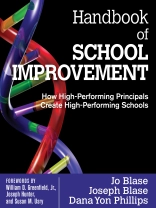‘A practical, useful, easy-to-read resource that I will keep on the edge of my desk as a reference. The book is filled with excellent and useful information and serves as both a concise summary of focal points for principals as well as a resource for additional information.’
—Kari Dahlquist, Principal
Creek Valley Elementary School, Edina, MN
‘All school administrators who want their school to become a high-performing school have to read this book. It is transformational!’
—Sean Beggin, Assistant Principal
Andover High School, MN
Learn how successful principals make a difference in their school′s performance!
Outstanding principals are made, not born. With insights drawn from a ground-breaking study and numerous firsthand accounts, this illuminating book reveals how principals develop the leadership qualities that support schoolwide achievement.
Written by best-selling authors and respected experts in school improvement, this comprehensive guide captures unique perspectives from 20 successful principals, representing a wide range of urban and rural schools. Presenting real-life strategies and best practices, the authors show how principals use a systems-development approach to build empowered teams and excellent organizations. Designed for school and district administrators as well as staff developers, this resource:
- Describes the key characteristics of extraordinary principals and high-performing schools, including nine crucial actions that drive positive change
- Focuses on how principals balance both administrative responsibilities and instructional leadership
- Shows how to actively involve teachers, staff, and families in school improvement, including individual and group activities
- Addresses the role of research and data in stronger schoolwide performance
- Offers tips and suggestions from highly regarded principals, along with recommended resources for further study and team trainings
Learn how the experiences of fellow principals can help you energize your team and realize your school′s promise!
สารบัญ
Acknowledgements
About the Authors
Preface
The Book in Brief
Foreword by William Greenfield
Foreword by Joseph Hunter
Foreword by Susan Usry
List of Figures
Part I. Administrative Leadership for School Improvement: Action Foci of High-Performing Principals
Introduction to Part One of the Handbook
What Is a High-Performing School?
What Is a High-Performing Principal?
The New Challenge of Leadership for School Improvement
1. Learning: Principals of High-Performing Schools Are Models of Learning
How Did They Learn?
What Did They Learn? High-Performing Principals Learned
Summary
Tips and Suggestions
2. Modeling: Principals of High-Performing Schools Are Exemplars of the Field’s Standards of Leadership
Activities for Becoming an Exemplar of Leadership Standards
Summary
Tips and Suggestions
3. Focusing: Principals of High-Performing Schools Focus on School and Teacher Practices Associated With Increased Student Achievement
Jigsaw Activity for School- and Teacher-Level Practices Influencing Student Achievement
Summary
Tips and Suggestions
4. Leading for Achievement: Principals of High-Performing Schools Lead in Ways That Have Maximum Impact on Student Achievement
Summary
Tips and Suggestions
5. Improving Instruction: Principals of High-Performing Schools Work With Teachers on the School Mission: They Engage in On-Going, Collaborative Study of School-Wide Instructional Improvement Efforts
Summary
Tips and Suggestions
6. Developing Systems: Principals of High-Performing Schools Use a “Systems development” Approach to Dispatch With Managerial Responsibilities and to Support Instructional Aspects of Work
Use a Systems Development Approach to Create Self-Sustaining Structures
Use Time Wisely
Plan Well
Manage the Budget Efficiently and Effectively
Manage the Physical Plant Efficiently and Effectively
Prevent Problems from Begetting Problems
Summary
Tips and Suggestions
7. Empowering: Principals of High-Performing Schools Take an Empowering (Team) Approach to Almost Everything and Create “Learning Communities” in Their School
The Leadership Team
Summary
Tips and Suggestions
8. Hiring: Principals of High-Performing Schools Hire Strong People for Administrative, Faculty, and Staff Positions
Know Who You Need
Involve Everyone in Hiring
Establish Hiring Protocols
Correct Hiring Mistakes
Summary
Tips and Suggestions
9. Using Data: Principals of High-Performing Schools Insist on Using Data to Inform Instructional Decisions
Questions About Data Use in Your School
Additional Helpful Materials About Data Use
Summary
Tips and Suggestions
Suggested Reading for Further Learning: Administrative Leadership
Part II. Instructional Leadership for School Improvement: Goals of High-Performing Principals
Introduction to Part Two
10. Teaching and Learning: To Maintain a Focus on Teaching and Learning
Summary
Tips and Suggestions
Culture: To Develop a School-wide Culture That Supports and Sustains Instruction
Summary
Tips and Suggestions
12. Dialogue: To Establish a Context for Dialogue About Instruction
Faculty Meetings: A Sea Change
Encouraging Frequent Teacher Dialogue about Collaboration
A Note About the Need for Common Planning Time Among Teachers
Summary
Tips and Suggestions
13. Research: To Reference Research-Based Instructional Elements When Observing Instruction and When Talking With Teachers
Element #1: Factors Influencing Achievement
Element #2: Planning for Instruction
Element #3: Standards-Based Instructional Units
Element #4: Components of Instruction
Element #5: Student Abilities That Teaching Strategies Should Enhance
Element #6: Effective Teaching Practices Across Content Areas
Element #7: Ordering and Pacing of Content and Instructional Strategies
Element #8: Addressing Diverse Students’ Needs
Element #9: Use of Technology in Instruction
Element #10: Models of Teaching
Element #11: Classroom Management (Discipline)
Considering the Value of Walk-Throughs
Considering Formal Evaluations
Summary
Tips and Suggestions
14. Development: To Provide Effective, On-Going Professional Learning, a.k.a., Staff Development
A Professional Learning Community
The Right Approach
Going Further
A Multitude of Learning Opportunities
A Good Use of Money
The National Staff Development Council Standards
The Special Case of Empowering and Developing Special Education Teachers
Professional Learning for Administrative Teams
Summary
Tips and Suggestions
Suggested Reading for Further Learning: Instructional Leadership
Part III. Conclusion: Systems Thinking and the Systems Development Approach in Educational Leadership
Introduction to Part Three
15. The Importance of Systems Thinking and the “Systems Development” Approach for School Improvement
Using the 4C’s Model as a Diagnostic and Prescriptive Tool
Summary
16. Afterword: A Summary and A Note About Preparation for Educational Leadership
References
Research Method and Procedures
Index
เกี่ยวกับผู้แต่ง
Joseph Blase is a professor of educational administration at the University of Georgia. Since receiving his Ph.D. in 1980 from Syracuse University, his research has focused on school reform, transformational leadership, the micropolitics of education, principal-teacher relationships, and the work lives of teachers. His work concentrating on school-level micropolitics received the 1988 Davis Memorial Award given by the University Council for Educational Administration, and his coauthored article published in the Journal of Educational Administration won the W. G. Walker 2000 Award for Excellence. In 1999 he was recognized as an elite scholar, one of the 50 Most Productive and Influential Scholars of Educational Administration in the world. Blase’s books include The Politics of Life in Schools: Power, Conflict, and Cooperation (winner of the 1994 Critic’s Choice Award sponsored by the American Education Studies Association), Bringing Out the Best in Teachers (1994, 2000, 2008); The Micropolitics of Educational Leadership (1995), Empowering Teachers (1994, 2000), Democratic Principals in Action (1995), The Fire Is Back (1997), Handbook of Instructional Leadership (1998, 2004), Breaking the Silence (2003), and Teachers Bringing Out the Best in Teachers (2006). His recent research (coauthored with Jo Blase and Du Fengning, 2008), a national study of principal mistreatment of teachers, appeared in The Journal of Educational Administration. Professor Blase has published over 120 academic articles, chapters, and books.












